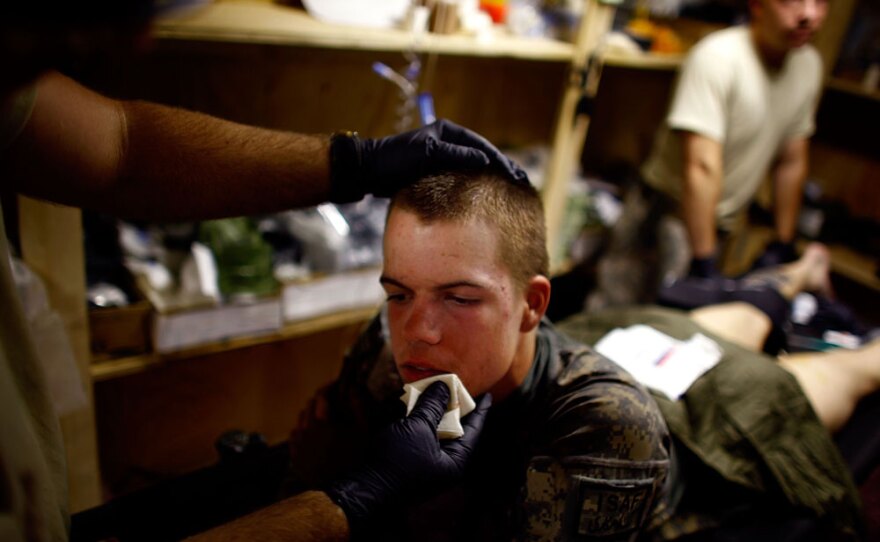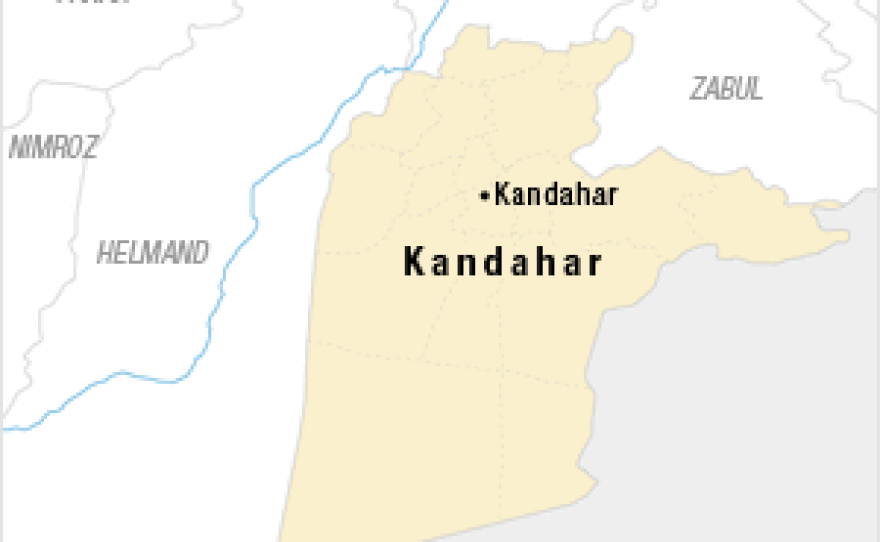At a combat outpost in Afghanistan's Kandahar province, Army Spc. Steven Hackworth lies on a cot and grimaces in pain as a medic rotates his wrenched knee.
Just before lunch, Hackworth and other soldiers from the 101st Airborne Division were patrolling through the village of Sangeray, just down the hill from this post. Suddenly, a man poked his head around a corner and threw something at the troops.
"I yelled, 'grenade!' and turned around and dove backwards and it went off," Hackworth recalls.

On a cot beside him, Army Pvt. Dan Oswald has a small puncture wound to his leg, and his face is peppered with cuts and bruises.
Oswald lifted his heavy rifle, known as a SAW or squad automatic weapon, to shield his eyes as the grenade came toward them. "I seen the grenade go off, I threw the SAW up into my face and just dove into the ditch," he says.
The village of Sangeray is in Zhari district, a wide patch of orchards, fields and villages north of Kandahar city, where Taliban fighters hide, plan their attacks and store their weapons. Some troops call it "The Heart of Darkness."
'Chance To Take Action As A United Front'
This was the fifth grenade attack Alpha Company has suffered in the past week. More than half a dozen soldiers have been wounded, though none seriously.
Their commander, Capt. Nick Stout, has had enough. He gathers his soldiers in his operations center. Local Afghan leaders and police join them.
Stout seems almost caged.
"And I want us to walk down there. This is our chance to take action as a united front and talk to the people about this," he says.
Stout stabs at a map of Sangeray, taped to the wall.
"We're going to figure out who was in this compound right here. And it's going to be an opportunity for us to stand together and say, 'Look, what's going on around here,' " he tells the men.

The mission for the day is to go after the people throwing the grenades. But there is a complication: Stout can't trust the Afghan police who are supposed to be on his side.
Shortly before the last grenade attack, one of Stout's soldiers spotted an Afghan police officer sneaking off to talk on his cell phone. "When we walked up, he was real quick to hide his phone and just act like nothing was going on," Stout says.
The Americans suspected him of double-crossing them and working for the Taliban. So they detained the policeman and searched him.
"And come to find out he had a couple of cell phones on him. He had a wallet with American money, lots of American money and Pakistani money," Stout says.
Stout's boss, battalion commander Lt. Col. Johnny Davis, perks up.
"How many police walk around with American $100 bills? I don't even walk around with American $100 bills," Davis says.
Trusted Afghan Ally Leads Search
There is an Afghan political leader in the area trusted by the American soldiers. His name is Karim Jan; he is the district governor.
The Americans summoned him to their operations center after the grenade attack.
"We are here to get rid of those people. So I am fighting with the Taliban face [to] face. Whatever happens we should investigate [those] guys and look for them," Jan says.
Jan shoulders an AK-47. U.S. troops and Afghan soldiers and police all gather in front of a truck. Stout opens a detailed map of Sangeray and places it on the hood.
"We've identified this compound right here as the potential focal point and where those attacks are being based out of. We're going to search some compounds, we're going to talk to some people, and if anybody's suspicious or we find anything, we're going to arrest somebody," he says.
They race on foot down a dusty path and across an asphalt highway. It looks like an international posse: Americans in helmets and body armor; Afghans holding heavy machine guns and running to keep up.
Jan leads the pack, angry as a bull as he charges into the marketplace.
The scene leaves children and shopkeepers alike slack-jawed.
As the Americans stand to the side, the district governor drags a shopkeeper out of his store. The young man has been detained before on suspicion of working with the Taliban.
I'm not going to tolerate anything. If I have proof that you work for the Taliban, I'm going to burn your house and destroy you.
Jan orders him to get down on his knees. A translator does his best to keep up with what Jan is saying.
"I'm not going to tolerate anything. If I have proof that you work for the Taliban, I'm going to burn your house and destroy you," he says.
Laying Down The Law, Afghan-Style
Jan releases the man and then strides down an alley, with the soldiers and police in tow, toward the compound where the grenade was thrown.
He bangs on metal doors. Men both old and young spill into the alley. An old man with a long white beard says he heard nothing. He says he had just returned from the fields and that he doesn't know who threw the grenade.
Jan threatens him, tugs on the man's beard and leans into his face.
"Find out or I'm going to burn your house," Jan says.
The international posse turns a corner. They spot someone they suspect has ties to the Taliban. He is not from this village. They grab him and begin to question him.

The man says that he is innocent but that his brother -- who isn't there -- is involved with the Taliban.
No one believes the man. The Afghan police handcuff him, place a hood over his head and march him toward the village center.
There is one more place in the village to check. Davis, the lieutenant colonel, and the others keep making wrong turns in this labyrinth of alleyways with walls 10 feet high on either side.
The group arrives at the site of another grenade attack. An elderly man and a toddler appear from behind a rusted metal door. The man admits that his older son threw the grenade, which wounded Americans.
"All these young kids, do they listen to me?" he says through a translator. "No, they don't listen to me."
The man says he ordered his son to leave the house.
Jan, the district governor, lays down the law.
"You have to promise me they will not use your compound to throw grenades or shots from your house," he tells the man.
'Absolutely Necessary To Win Kandahar City'
Back at the U.S. outpost, after dinner and as the sun begins to set, Stout heads to the top of a guard tower the soldiers call the Crow's Nest. He looks out over Sangeray. In the soft light, the village looks peaceful.
Stout says more American and Afghan soldiers will be coming in, establishing more combat outposts and conducting more patrols into the village and beyond through the thick carpet of orchards that stretches to Helmand province in the west.
What it takes is someone they know, somebody's that from the area, that goes in there ... walking right beside us, saying, 'This is how it has to be; this is what is going to secure your town.' And eventually, that tide is going to turn.
"This is absolutely necessary to win Kandahar city and cut off [the militants'] supply line from Kandahar to Helmand," he says.
But Stout knows he'll need more Afghan partners like Jan.
"What it takes is someone they know, somebody's that from the area, that goes in there ... walking right beside us, saying, 'This is how it has to be; this is what is going to secure your town.' And eventually, that tide is going to turn," Stout says.
That's all uncertain. But at least for this one day, Stout can point to a few victories. Jan took a bold stance. A few suspects are under arrest. And one of his wounded soldiers, Hackworth, was promoted to the rank of sergeant.
Standing before Alpha Company, the new sergeant had a message for the troops: Watch out for grenades.
Copyright 2022 NPR. To see more, visit https://www.npr.org. 9(MDAzMjM2NDYzMDEyMzc1Njk5NjAxNzY3OQ001))

















